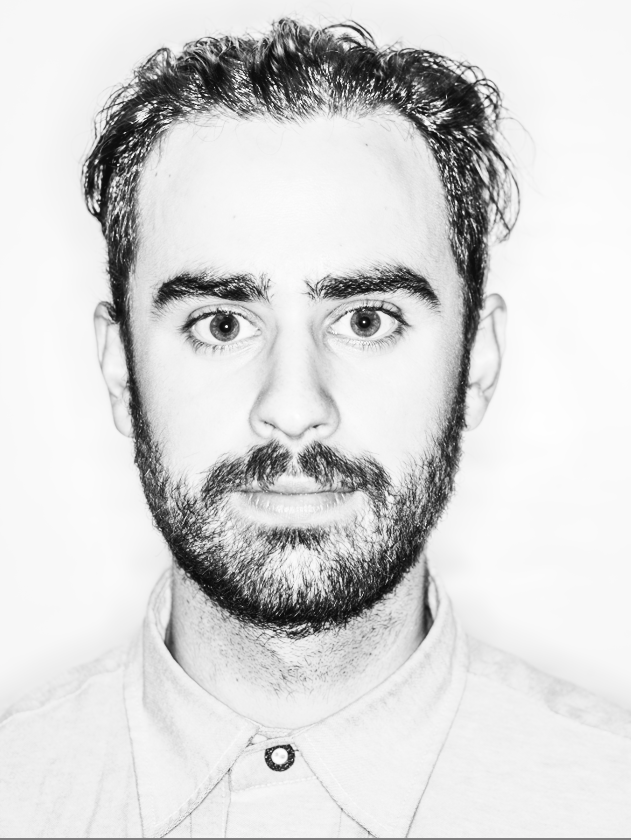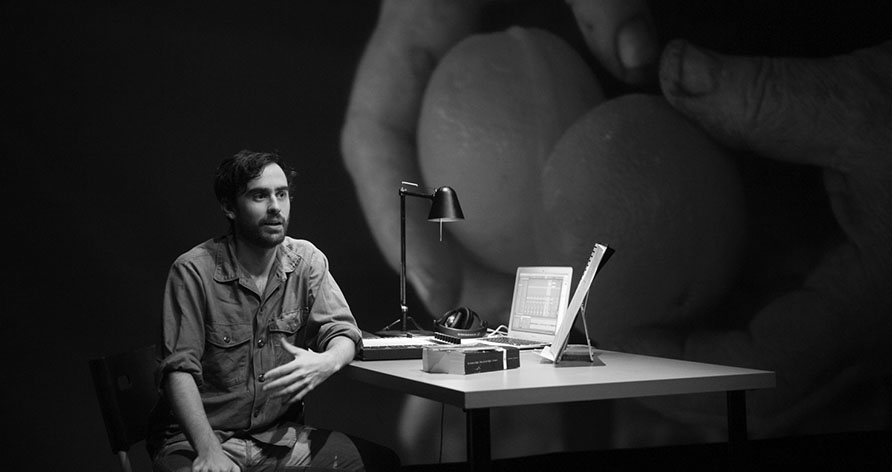Sydney-based radio producer and artist Jesse Cox currently produces This is About for ABC RN. Before that, he hosted and produced Radiotonic and Long Story Short, co-founded All the Best and made the Third Coast Award winning stories ‘The Real Tom Banks’ and ‘Keep Them Guessing’. His audio work has been performed or exhibited publicly at arts festivals, installations and live on stage.
Jesse spoke to us about perfectionism, taking a radio show off air and online, and how beneficial listening with others can be.
Update: Jesse Cox died on 19 December 2017. At the time, he had left ABC RN to take up a position as head of original content for Audible Australia. In his wake, a young family and a wide appreciation and respect for his passionate pursuit of creative storytelling.

What piece of audio has had the most profound effect on you?
I remember being particularly struck when I stumbled across a short piece that legendary ABC producer Tony Barrell had made, called ‘The Valentich Mystery’. It tells the story of 20-year-old Richard Valentich, who disappeared over Bass Strait while on a training flight in the 1970s. Shrouded in the mystery of a possible UFO sighting at the same time, it sounded like something right out of a sci-fi film and I couldn’t tell if the piece was documentary or fiction. I particularly loved the way the radio communications were re-created. Recreations sound naff 99% of the time (this applies to documentary, but is also why audio fiction is so hard to get right), but the way Tony and sound engineer Steven Tilley did these worked so well.
Where did the idea for This is About come from?
We had been working on Radiotonic for close to two years, and lots of great things had come out of it. We were working with a wide range of excellent local and international writers and producers, and I felt that we had gotten the tone right (mostly). But I was unsatisfied that we were trying to do everything under the creative audio narrative sun within the one programme. We were locked into a linear broadcast schedule that was placing a huge amount of pressure on what we were producing, and I wanted to find a way to make what we were doing sound better.
We pitched to take the programme off air, and to create new pod-first offerings that would take the best bits of Radiotonic and re-launch them as more distinctive podcast offers. This is About is looking to fulfil the narrative non-fiction part of our old brief – and we have several other projects in development that will look to fill the other parts of what we had been making under the Radiotonic banner.
What’s your favourite part of making This is About?
Working with an awesome team – Belinda Lopez, Jordan Raskopoulos and Sophie Townsend (plus all the colleagues and freelancers we are starting to pull in). Stuff sounds better when you collaborate. I have collaborated with lots of people on creative projects (not just audio). Sometimes it clicks, and sometimes it doesn’t. With This is About, we have totally clicked.
What’s the hardest part of producing This is About?
Being satisfied with the end product (always)! You can’t make perfect radio, but you try to make it as close to that as possible. Most of the time you fall short, but by reflecting on what works and what doesn’t (and getting lots of honest feedback), you slowly chip away at what you aspire to create.
This is About is still very much in its early days, and a day doesn’t pass when we don’t have an in-depth conversation about the direction we want to take the show editorially and creatively.
What’s the best thing about working with sound?
You don’t need much gear. You can construct a story in the perfect narrative arc by rearranging tape and hiding all the edits (no need for overlay here). And it’s cheap (well, relative to TV), so if you want to go deep under the water – or to the far edge of the universe – you just need some cool sound effects.
What’s the best (or worst) advice you’ve received about radio / podcasting?
I don’t know if this applies directly to what I am working on now, but I remember interviewing [Heavyweight, WireTap producer] Jonathan Goldstein who talked about how one of the main creative decisions he took when developing WireTap was to sometimes make up the ending of a story. Partly because it made them more dramatic than the real life version, but also because they could turn stories around more quickly. Obviously that was a creative decision, but it was creatively born out of practicality.
You can’t make perfect radio, but you try to make it as close to that as possible. Most of the time you fall short, but by reflecting on what works and what doesn’t (and getting lots of honest feedback), you slowly chip away at what you aspire to create.
What followed was such a beautiful, memorable and unique show. I feel like sometimes we have ideas that are far bigger than our budgets or resources. Sometimes changing the pitch of the idea to match the available resources will ultimately lead to a much more accomplished product. And after you have made something successful you can then use that to argue for more resources to help you reach for your original lofty goals!
What has been your biggest lesson as a producer so far?
I was working on my very first feature that had been commissioned by the ABC and I remember sitting in an edit booth and playing an early rough cut to (then 360documentaries executive producer) Claudia Taranto. Claudia gives great notes – but before she had even started talking, I already had a couple of pages of my own notes. I got so much from just seeing when she had laughed or smiled, and at what points I could tell she was clearly bored (there were lots of those!).
It was mortifying, but one of the best things I’d experienced. It goes without saying – get feedback from people who will be honest. It is even more effective if you can sit together and listen. I don’t do it enough.
Do you interact with your audience, or receive feedback or criticism about your work?
Not as much as I would like. We are trying to get more and more feedback as we develop This is About, and we have been getting some really constructive feedback from colleagues and the odd line from listeners. But I wish we got more from listeners.
If you could go out to dinner with any audio maker, who would it be – and what would you talk about?
I remember inadvertently crashing dinner with one of my radio idols (it’s a long story … we were kind of invited, then they forgot). Anyway, I had heard them talk a few times, and I had read a bunch about how they do what they do (all really useful), but then I realised I didn’t have much more to ask them that they wouldn’t have already said in something I’d watched or seen. I realised that I would have loved them to listen to and critique a piece I was working on. Ultimately, I think you just want your idols to give you notes on your own stuff, so you can see them apply all their tools in a really a practical situation.
But so as to not cop out – I’d have dinner with Cathy Fitzgerald. She is one of my favourite producers.

What are you listening to at the moment?
I just finished APM Reports’ In the Dark. With so many true crime podcasts coming out at the moment, I think this one is a really interesting example of how to get the tone right. Clearly audiences want more podcasts from this genre, but there are lots of true crime podcasts out there that feel a little icky. If we are going to be making more true crime, we must know why we are doing it – and get the balance between reporting, storytelling and the gory reality of the horrible things that people do to other people.
Also currently on rotation are stories and episodes from Love + Radio, The Real Thing, The Truth, Strangers, Short Cuts, Background Briefing and Reply All.
What’s your favourite Australian podcast, and why?
Sorry, pass. That’s too hard. I have two lists: great Australian podcasts that are being made, and podcasts that I wish existed from some of my favourite local makers (come on – you know who you are!).
What do you think is unique about Australian audio?
Our humour and our vernacular are unique. We have a long history of borrowing styles from around the world, but our work has also influenced some of the biggest modern day podcasts (one of Radiolab’s major influences was ABC legend Sherre DeLys, for example). I think what makes Australian audio unique is how we pair global trends and styles with our vernacular, rhythm of language and humour. This creates something distinctly ours.
What’s next for you as a producer?
We have a few things on the boil at the moment. Obviously, continuing to make This is About. I’m excited about the stage we are entering with the programme and am looking forward to cementing the show next year. We also have some cool projects we have in development via the Ian Reed Foundation. I’m hoping to share these in more detail in 2017.